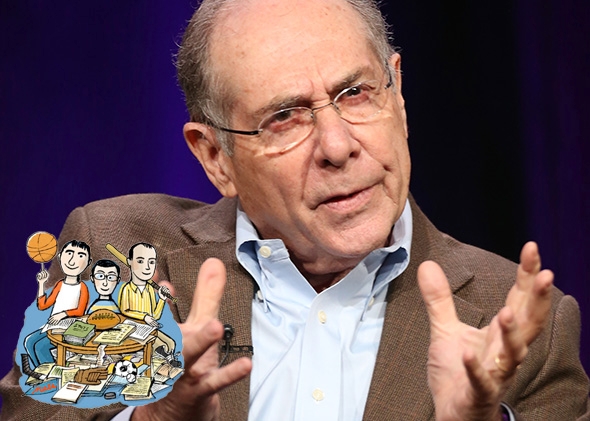Inside the ESPN Empire
An exit interview with ombudsman Robert Lipsyte.

Photo by Frederick M. Brown/Getty Images. Illustration by Slate.
When ESPN named legendary sports journalist Robert Lipsyte its ombudsman in April 2013, the decision was cheered by Deadspin, the Worldwide Leader’s chief antagonist. Calling on Lipsyte was a surprising decision for ESPN, whose broadcasting entanglements with sports leagues mean that turning athletes into heroes is sort of the company’s business model. The former New York Times columnist, by contrast, made his name by straying from the pack of sportswriters he charged with “godding up” sports stars.
On Monday, to mark the end of his ombudsman tenure, Lipsyte did an exit interview with Slate’s Hang Up and Listen podcast about his role with the network. When asked if ESPN’s journalism—which Lipsyte says is the only aspect of ESPN’s operations he felt qualified to criticize—met his standards, he said, “No, absolutely not. I think that ESPN could be better.” But he also acknowledges the difficulty of walking the line between the network’s two jobs as a presenter of live sports entertainment and as a media organization that digs into things that sports leagues might not want us to know.
ESPN’s primary job has always been, as Lipsyte describes it, “putting up those pretty pictures, buying rights, promoting games … selling the spectacular.” ESPN is relatively young and has grown quickly “without any kind of traditional journalism heritage,” Lipsyte says. It has used its considerable piles of money to “buy some really good journalists,” but the network, he believes, “is still trying to figure out how to use them properly.” He calls ESPN a vast empire, and points to the SEC Network as the most mind-blowing part of that empire. “Extensive investigative reporting into the exploitation of college athletes, and the legal battles around that, would seem to conflict with ESPN’s business model,” he writes in his final ombudsman column. “How do you turn over the rocks in the Southeastern Conference, for instance, while owning the SEC Network?”
ESPN is the best in the business, Lipsyte says, at transactional reporting: breaking the news that helps us watch the games it will broadcast later, telling us “who is going to be traded, who’s hurt, who’s going to actually start on Sunday.” But Lipsyte believes that “where they have to go is the transgressions: the evil that the leagues do.”
The tension here isn’t just between ESPN and its business partners in the NFL, NBA, and MLB. It’s between ESPN and its viewers, who mostly don’t seem to care whether the leagues are doing evil.
Lipsyte says he received close to 20,000 emails during his time as ombudsman. Lots of viewers complained about specific on-air issues—why is this person still on the air, or why does ESPN hate my favorite sport, particularly if that favorite sport is hockey. But what really bothered ESPN’s core audience, Lipsyte says, was “the intrusion of what they called societal issues into what was, in a way, kind of a sacred place. People so often come to sports as this sanctuary from the real world, where they can sit in their living room with their family and not be assailed by anything that will upset them.” For some, that upsetting thing was the sight of football player Michael Sam kissing his boyfriend to celebrate being drafted.
Other viewers had a bigger-picture complaint. Lipsyte says that most ESPN watchers don’t want to confront the “reality that the pleasure that you are getting is at the terrific physical and often emotional cost of those commodified ballplayers,” that “we really don’t want to think these people are real people; and then when they do emerge as real people, they hit their girlfriends and we get very exercised and we want them executed.” For Lipsyte, that is where sports journalism must go. He says, “It’s there, in that junction between what sports are supposed to be for some people—Never-Never Land, this Oz—and what it really is, which is a kind of window on reality.”
Responding to Lipsyte’s criticism of how ESPN’s College Gameday handled allegations of sexual assault against Florida State quarterback Jameis Winston, ESPN college football broadcaster Chris Fowler had this to say in Rolling Stone: “When you cover this sport, you always have to live in a bit of denial. You check some things at the door. It’s entertainment, it’s a diversion, it’s a distraction from the real world.” In his last ombudsman column, Lipsyte responded, “I appreciate Fowler’s insight and candor, but denial, in all its forms, is at the core of most of sports’ current crises.”
How can ESPN get out of denial? Lipsyte has a simple solution: Create a central news desk—what he calls ESPN-J in his final ombudsman column—that would remain separate from the entertainment side.
In his interview with Hang Up and Listen, Lipsyte says that ESPN can do great journalism—citing the network’s great reporting on concussions as an example. But the willful blindness apparent in Fowler’s statement—which may or may not be appropriate on the entertainment side—leads ESPN to lose focus on the investigative journalism that a vast empire, with its accompanying resources and power, is capable of doing on a day-to-day basis.
Lipsyte says that he doesn’t think he had any impact at all on ESPN—that he got some nice compliments from people on the inside but doesn’t feel like he changed the culture in any meaningful way. Let’s hope that’s not true, and that ESPN heeds his advice to do the sort of journalism that makes its business partners—and maybe even its viewers—uncomfortable.